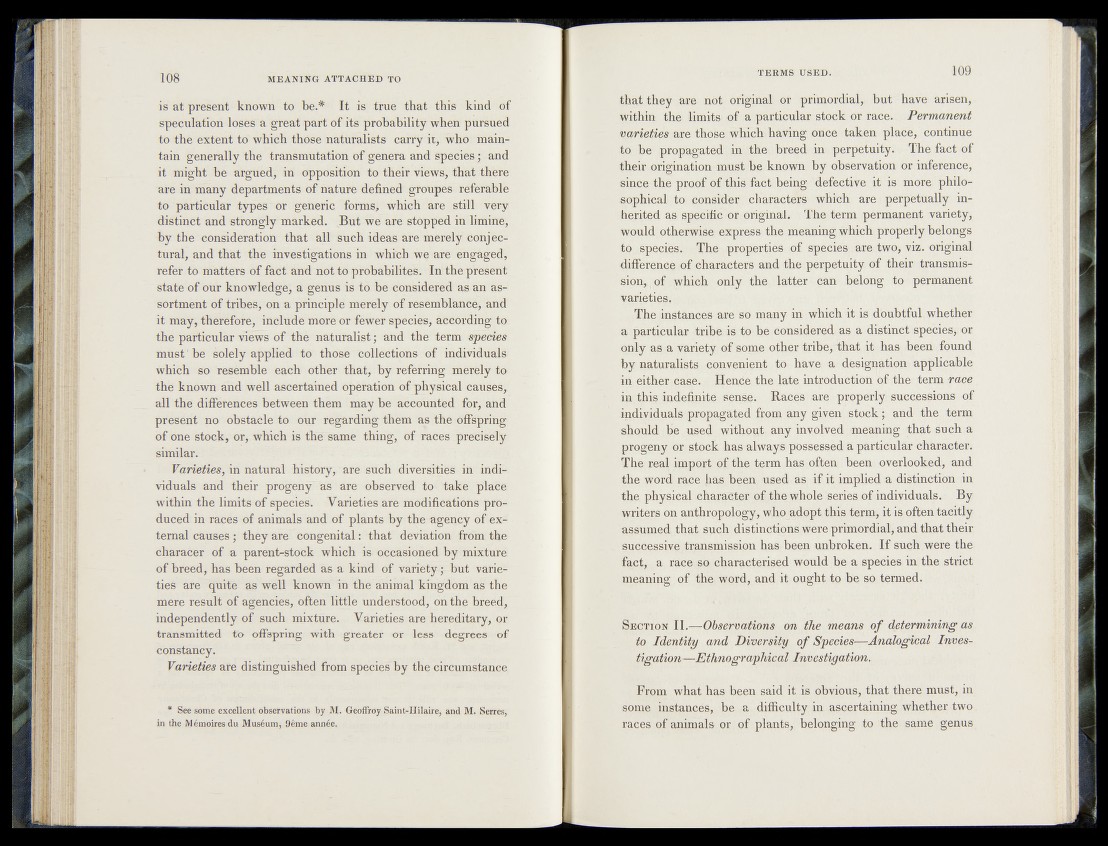
108 MEANING ATTACHED TO
is at present known to be.* It is true that th is ' kind of
speculation loses a great part of its probability when pursued
to the extent to which those naturalists carry it, who maintain
generally the transmutation of genera and spéciès p and
it might be argued, in opposition to their views, that there
are in many departments of nature defined groupes referable
to particular typés or generic forms, which are still very
distinct and strongly marked. But we are stopped in limine,
by the consideration that all such ideas are merely coiijéc:-
tural, and that the investigations in which we are engàged,
refer to matters of fact and not to probabilités. In the present
state of our knowledge, a genus is to be considered as an assortment
of tribes, on a principle merely of resemblance) and
it may, therefore, include more or fewer species, according to
the particular views of the naturalist ; and the term species
m u st'b e solely applied to those collections of individuals
which so resemble each other that, by referring merely to
the known and well ascertained operation of physical causes,
all the differences between them may be accounted for, and
present no obstacle to our regarding them as the offspring
of one stock, or, which is the same thing, of races precisely
similar.
Varieties, in natural history, are such diversities in individuals
and their progeny' as are observed to* take placé
within the limits of species. Varieties are modifications produced:
in races of animals and of plants by the agency of external
causes ; they are congenital : that deviation from the
characer of a parent-stock which -is occasioned by mixture
of breed, has been regarded as a kind of variety;- but varieties
are quite as well known in the animal kingdom as the
mere result of agencies, often little understood, on the breed,
independently of such mixture. Varieties are hereditary, or
transmitted to offspring with greater or less degrees of
constancy.
Varieties are distinguished from species by the circumstance.
• See some excellent observations by M. Geoffroy Saint-Hilaire, and M. Serres,
in the Mémoires du Muséum, 9ême année.,
that they a re , not original or primordial, but have arisen,
within thé limitsnof .a,particular stock or race. Permanent
varieties are thpseflwhich having once taken place, continue
HI be propagated, in the. breed, in- perpetua%®t;The fact of
their originatipm must be known by observation or inference)
since the proof of this fact being defective it is more philosophical
to consider; characters which are perpetually inherited
as specific o^qfejgipéL ‘ The term pérmanent variety,
would otherwise express the meaning which praperly belongs
tp Ospepiés, The properties of species,, are jtwo,-viz. original
difference of .characters and the-perpetuity pf their» transmission,
(of which only the latter- can belong, to permanent
varieties.,
The instances are so many in which it is^fibubtful, whether
a particular bribe* is to be considéréd-jas a distinct Bpeciesjior
only as :a variety of'some ,oth,er .tribe,"that it has been. found
by naturalists cqpypnient to-haye, a désignation applicable-
in either/case.; Hence, the late intrad® ction of the term race
in t th ig j^ e fin ite< sense• Baces are properlyl successions*pqf
individuals^ propagated from any given ! Stock ; and the .term
should ,be used t,without any involve^ y e a n in g 'th a t such;a
progepy or stock has always possessèd a particular character.
The real import of the term has often beenyoyerlooked, and
the word race Jjas been used as if it implied a distinction in
the physical oharaCfér of the whole sériés of individuals. - By
writers on anthrppqlqgy, whojadopt this term, it is; often tacitly
assumed that such distin étions' were primordial, and that their
successive transmission has been unbroken. If such were the
fact, a race so characterised would .be a .species in the strict
meaning of the word, and it ought to be so termed.
S e c t io n I I .— Observations on the means o f determining as
to Identity and Diversity o f Speeies—Analogical Investigation—
Ethnographical Investigation,
From what has been said it is obvious, that there must, in
some instances, be,.a. difficulty in ascertaining whether two
races of animals or of plants, belonging to the same genus.